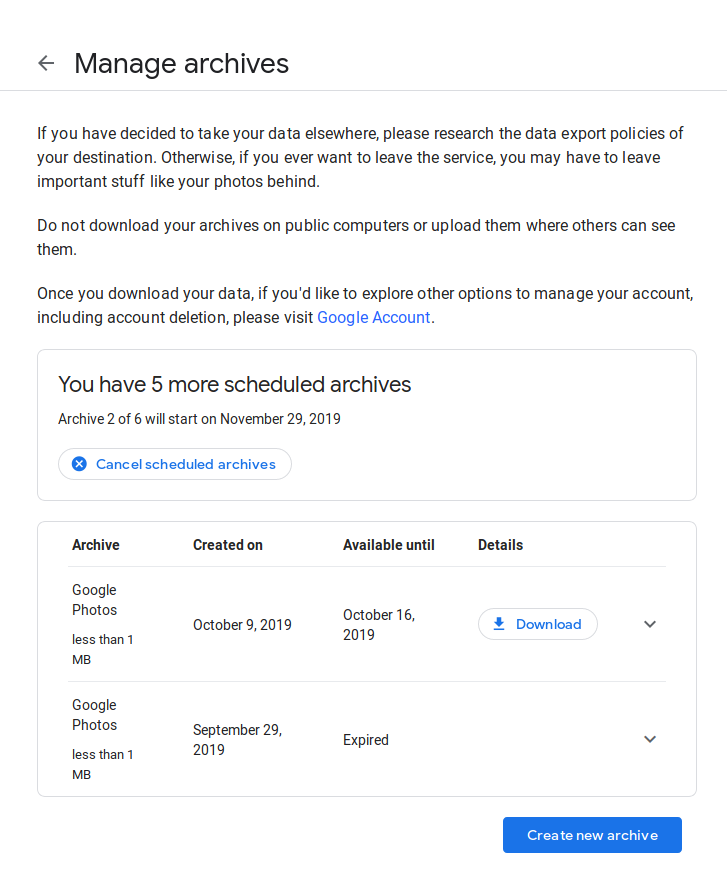You probably store an important part of your digital life in Google services: photos, contacts, emails, history and more. So far, the folks at Google have been doing a good job to keep this data safe—although not exactly private. But what if one day you lose access to your account, or what if Google loses your data?
Take the example of Google Photos. Photos are one of your most valuable digital assets. If you delete an app, you can reinstall it; if you erase a photo, some details of your memory are gone forever. Over the years, it is convenient to organize photos in the cloud, and Google Photos is extremely good at that. It is so convenient, that it is tempting to delete the local copies of photos on your phone, to only keep the cloud version.
Google does not guarantee anything on its free services
But you don’t pay for that. You don’t have a contract with Google that ensures that your data is safe in the long run. You are trusting a private company to keep your most precious memories for free. Google doesn’t owe you anything: they are just providing amazing services for free in exchange for your data, without any guarantee. It is written explicitly in their terms of service:
We provide our Services using a commercially reasonable level of skill and care and we hope that you will enjoy using them. But there are certain things that we don’t promise about our Services.
Other than as expressly set out in these terms or additional terms, neither Google nor its suppliers or distributors make any specific promises about the Services. For example, we don’t make any commitments about the content within the Services, the specific functions of the Services, or their reliability, availability, or ability to meet your needs. We provide the Services “as is”.
Source: https://policies.google.com/terms?hl=en#toc-warranties-disclaimers
There is another reason for backing up your data: it makes you free. What if you want to move to another service? It is unfortunately common to stay stuck in proprietary services for the simple reason that they own your data. If you can move your data around under an interoperable format, then you are free to choose the service that suits you the best, and that service may change across time.
It is legitimate to trust Google and enjoy the quality of their services, but you should not be naive. At least, you should backup your account data in a place that your control, just in case.
Takeout
The good news: Google designed a tool to export your data. It is not well-known but works quite nicely. And since Google doesn’t guarantee anything about their service, in particular, nothing indicates that this service will be available forever (RIP Hangouts and Google Reader). You should make a backup of your data while it is still time!
Just go to the following page: https://takeout.google.com.

You can then select the services for which you want to export your data. The most valuable are usually the data-heavy services like Photos or Drive, but you might be interested in keeping a copy of your contacts, emails or even Youtube history.

If you are hooked to Google services, they have a huge heap of data to pack for you—for example, dozens of gigaoctets. The backup consists of a list of zip files. You can choose the maximum size of a file: it can be more convenient to split the backup into many small files, for example if your connection is slow or tends to crash.
It can take some time, so Google will send you an email when they are ready. In the meantime, you can make sure that you have enough space on your computer or external hard drive to store the massive backup. When the archive files are ready, you have some time to download them before the links expire.

Finally, when you extract the files contained in the zipped archive, you get neat folders for each service. To make it easier to browse, you can use a local webpage as an interface.

Conclusion
I hope that you won’t forget to keep this archive in a safe place, and repeat the backup process regularly! More importantly, it is a good exercise to think about the architecture that underlies your daily digital life: the cloud is not a magical place from which you can recover your photos or your files at any time.
The cloud is a piece of complex machinery stretching across continents, from bare-metal servers to your personal devices through layers of software and network infrastructure. It is also a human machine made of content creation, business incentives, emotional value, data exploitation and relations of trust and power. Don’t be a blind cog in this machine.